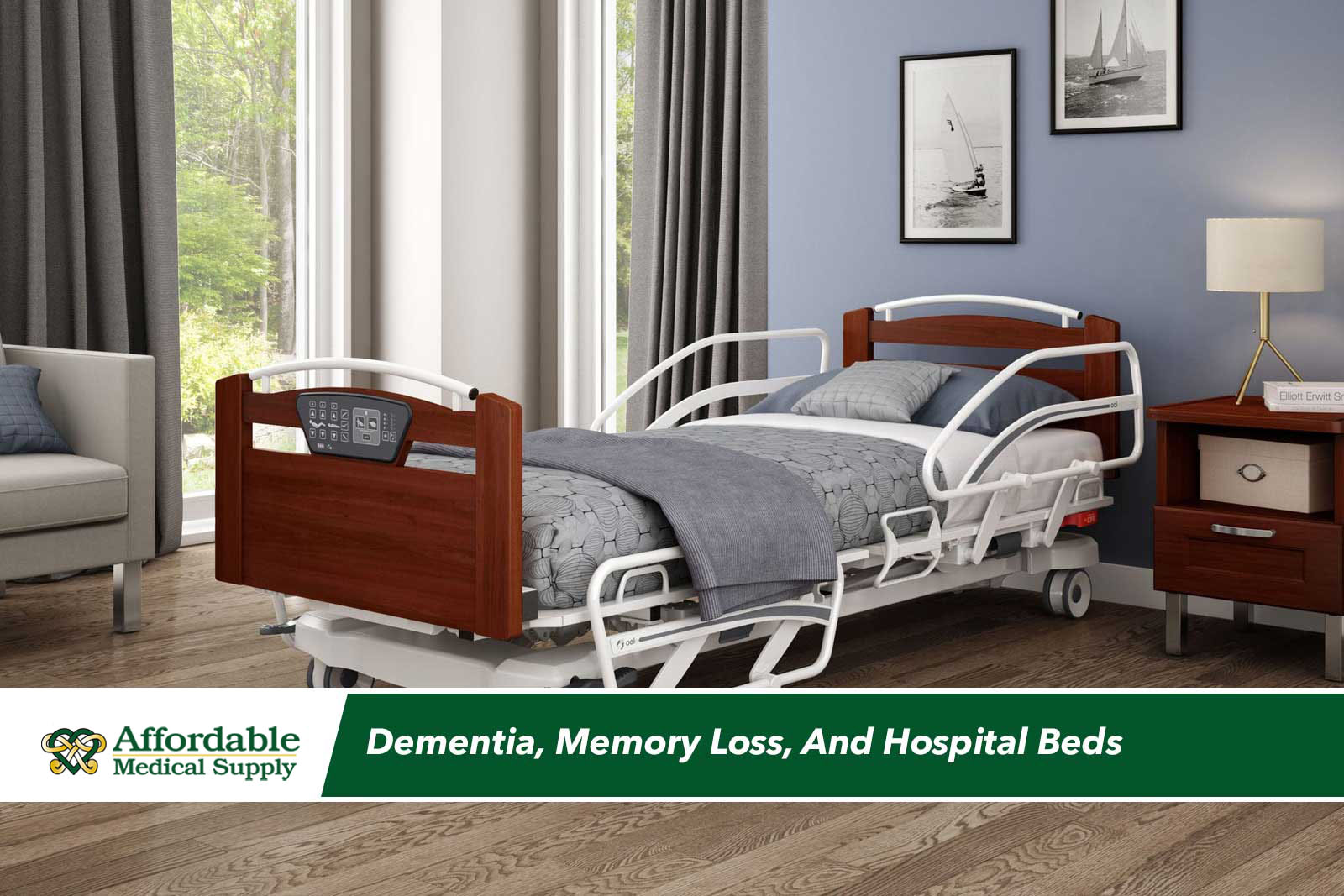Dementia, Memory Loss, And Hospital Beds

Dementia occurs in many different forms. It is a general term that describes a decline in mental ability to the extent where it interferes with daily life. While the most common form of dementia is Alzheimer’s disease, there are many others. For example, another common type of dementia is Vascular dementia which occurs after a stroke. Dementia is often associated with memory loss as one of the dominant symptoms, and when the condition gets worse, night time and sleeping becomes a difficult issue. Here we discuss dementia, hospital beds, and how to best handle the night time situation. This article addresses how to choose the correct Hospital Bed for a dementia patient and the night time difficulties for them as well as the caregivers.
Understanding Dementia and Memory Loss
Dementia is caused by physical changes to the brain and is caused from a variety of issues. Although studies and tests are constantly being done by leading neurologists to better understand dementia, some of the most common causes are vascular disorders, traumatic brain injuries, long time abuse of alcohol, neurological diseases, infections of the nervous system, and other conditions that build fluid in the brain.
When damage is caused to the brain, the brain cells are affected and their ability to communicate with each other is restricted. As a result, some of the most common symptoms are visibly noticed. Symptoms can include communication, memory loss, difficulty speaking and finding the correct wording, thought processes, changes in mood and their disposition, reasoning, comprehension, balance, lack of personal care for themselves, changes in their appetite and overall disorientation. People facing the affects of dementia many times have a high tendency to have their feelings hurt and the caregivers have a difficult time calming down the behaviour. Depending on the cause, and the region of the brain that is affected, the symptoms may vary in significant ways. There are many different stages of dementia that only a professional can help diagnose.
In some instances, dementia may be progressive. The symptoms may appear slowly and get progressively worse over time. Since there is no single test to determine if someone has dementia, doctors rely on a careful medical history examination, a physical examination, testing and the presences of various symptoms.
Memory loss is one of the most regularly referred to symptoms of dementia. People suffering from dementia often experience short-term memory loss concerning daily tasks such as keeping track of items, remembering appointments and paying bills. Memory loss is commonly associated with Alzheimer’s and other dementia types. The symptoms can demonstrate in the following ways:
- Memory loss that disrupts day-to-day living.
- Difficulty in planning and solving problems.
- Completing familiar tasks become a challenge.
- Confusion, especially regarding time and place.
- Difficulty in comprehending visual images and spatial relationships.
- Recently developed difficulties with words in both speaking and writing.
- Misplacing belongings and having trouble with retracing steps.
- Poor judgement and decreased attention.
- Isolation and the removal of self from work and social activities.
- Obvious changes in mood and personality.
Detecting these symptoms early can help with being prescribed possible medications to help with some of the symptoms.
The Progression of Memory Loss and Hospital Beds
Most children who have a parent with a memory disorder, would still like to care for them in the home setting. Depending in the severity of the dementia, it is normally easier to care for them during the day as their demeanor is more manageable. As the day progresses, the agitation levels may heighten and perhaps “sundowners” will set it. Sundowners is a state of confusion and disorientation that occurs in the late afternoon and into the evening. This is important to understand since bed time is near and sleeping becomes increasingly difficult as the anxiety sets in.
Night time is one of the hardest periods for a dementia patient and the caregiver. It is also one of the only times the caregiver can get their rest which is highly important to all caregivers. The questions is, how can a caregiver be assured of the safety of their loved ones safety during the night if they try to get out of bed. Most often the dementia patient will not remember that they are unbalanced, can’t walk or need help to get to the bathroom. Even if the patient has a diaper or pull up, the patient does not remember and often tries to get out of bed. This is when the falls occur which may break a hip, a concussion or other broken bones. It is sad and it becomes one of the most difficult situations for a family.
What sleeping arrangements can be made to help in this most serious situation?
There aren’t many choices for the caregivers when it comes to the sleeping arrangements for a patient with dementia. You could pay for a night time aide to watch over the client so they don’t get out of bed, but it is costly.
Now let’s look at the choices for hospital beds. A standard hospital bed lowers to about 19” without the added mattress. When adding the mattress, the bed height is approximately 25-27 inches from the floor. That is a far way to fall. Even a standard hospital bed that has full rails won’t stop a patient from getting out of bed. Some patients will try to “escape” from the bottom of the bed or may even try to climb over the rails. Most always this ends up being catastrophic to the patient as statistics show it almost always results in a fall that requires a hospital stay. That stay may worsen the effects of the dementia as pain medications may need to be administered and it all affects the brain.
We suggest buying or renting a Full Electric High “low” hospital bed for the safety of the patient and relief to the caregiver or family. A High Low Hospital Bed is fully electric and can be raised into the high position for care giving, but will lower within 7” to 9” from the floor for sleeping. When it comes time for bed, lower the bed all the way to the floor. This way, if they try to get out of bed, 99% of the time they cannot get up from the floor to stand and walk. You can even place a fall prevention mat next to the bed in case they try to stand and find themselves giving up and lay on the mat.
We do not suggest Bed alarms as they are very startling to a patient with dementia and the scare will most times cause a fall from a standard hospital bed. Bed alarms will sound the second the body pressure is released off the alarm pad. The problem with that scenario is that the patient is already standing by the time the caregiver hears the alarm and the patient may already be walking which is dangerous. Also, the loud alarm may cause them to fall when startled. By lowering the hospital bed to the floor, you protect them from a catastrophic fall. Some families have even reported finding their loved ones on the floor on the fall mat sound asleep with the covers pulled on top of them.
Taking advantage of purchasing a high Low Hospital bed or even renting a hospital bed can drastically improve the risks of falls and the comfort of someone suffering from dementia. Affordable Medical Supply offers solutions to medical needs by matching the disease and conditions to the best choices of medical equipment to meet your caregiving needs and those of the patient’s safety.
Hospital beds are one of the most important medical equipment decisions to be made for both the safety of the patient and for meeting the caregiving needs of the family. Visit Affordable Medical Supply and see how the different types of beds operate to your advantage, or call us today and ask for a consultation.



